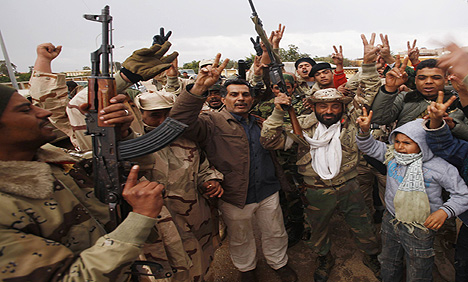Bloodshed and fierce, sporadic fighting is causing strenuous impact on local citizens. As of the beginning of July Tripoli reported that the undersecretary at the Ministry of Awqaf and Religious Affairs has been kidnapped and at least 21 members of the Libyan National Army (LNA) forces were confirmed dead on June 29 when they clashed with the Shoura Council of Mujahideen in Derna (SCMD), who also reported the deaths of eight members.
There is also indigenous civil warfare between the Tuareg and Tebu tribes in Libya’s southwestern section. Tuareg soldiers, who remained loyal to Gaddafi until his assassination, are still waiting for their promised Libyan ID cards, access to a quality education, and an escape. The Tebu tribe, backed by the Dignity government, sided with revolutionaries hoping for a better life that, due to corruption, is yet to materialize. Gas stations along the town of Sebhu, the one and only roadway to Ghat, are forced to be closed down as Tebu snipers block the path. Not only that, Libya’s militia-run police force terrorizes religious minorities, officials and workers who previously served under Qaddafi.
Libya has become extremely unstable and in a long-lasting state of civil war. The once good-quality lifestyle has now become dark and desperate. Food is scarce, shelter is lacking. The economy is in a total state of collapse. Since September, the conflict has claimed hundreds of lives and displaced most of the region's population. The growing displacement crisis seems likely to worsen further as many internally displaced peoples (IDPs) are unable to return and or have no sustainable conditions to return to.
“The ghastly conditions, coupled with spiraling lawlessness and armed conflicts raging within the country, make clear just how dangerous life in Libya is today,” said Philip Luther, Amnesty International’s Middle East and North Africa Director. “The international community has stood by and watched as Libya descended into chaos since the 2011 NATO military campaign ended, effectively allowing militias and armed groups to run amok”.
The situation is so frightful that most international organizations left Libya last summer, therefore comprehensive data on internal displacement is hard to come by due to the deteriorating security situation. The United Nations refugee agency (UNHCR), and also the UN Support Mission in Libya (UNSMIL), now has very limited access to the areas undergoing extreme volatility and is also unable to reach other affected regions. Data collection is even further complicated by the weakness of local authorities. UNHCR has to rely heavily on local partners from local crisis committees, municipalities and non-government organizations (NGOs) directly involved in providing assistance to IDPs, to provide numbers of the amount of IDPs within Libya. “The internally displaced persons comprise of 83,697 families, but the numbers could be higher,” said UNHCR's senior spokesperson, Melissa Fleming. “This also reduces communication and monitoring and for these reasons their figures are an estimate.”
Food and relief items are currently being distributed to 70,000 IDPs in Zintan and the Nafusa Mountains area, to 30,000 in Warshafana, to 20,000 in Zawiyah and to more than 30,000 persons in various locations in Tripoli. Critical non-food items, hygiene kits, medical assistance and financial support is also being provided to refugees and asylum-seekers and to the most vulnerable who are located in urban areas. People held in detention centers, after being rescued or captured at sea by the Libyan Coastguard, are being offered other types of humanitarian assistance.
According to The Internal Displacement Monitoring Centre (IDMC) the number of displaced persons has almost doubled since last September to now more than 434,000 amid escalating fighting this year. In the West, numbers reach at least 269,000; approximately 90,000 persons in the East, and in the South, at least 18,500. The UN Office for the Coordination of Humanitarian Affairs (OCHA) states that the majority of IDPs are either being hosted by relatives in urban environments and local communities or in public shelters. Many continue to reside temporarily in schools, parks and parking lots in Ajdabiya and other neighboring towns. In the southern desert border town of Ghat some IDP families even live in empty water tanks. Not only that, host communities are also equally affected due to lessened access to education, affordable health care, electricity and other key services.
With more than 60 schools and universities having been closed down in Benghazi, there has been a rise in youth criminality which stems from the absence of rule of law. This also ties in with the fact that Libya's clashing governments have backed armed groups across the country fighting over oil assets and infrastructure, while showing support to the opposing forces. “There have been frequent reports of civilian casualties as a result of fighting in the coastal. Landmines and unexploded ordinance are also a danger to the internally displaced,” said Fleming.











